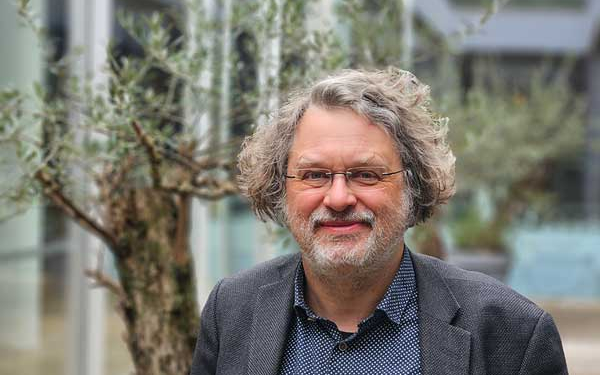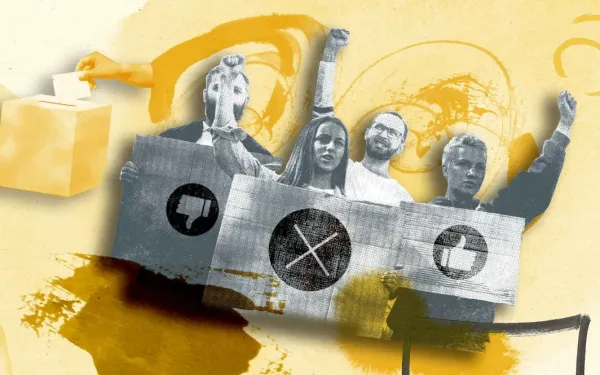
Hanna Barakat & Archival Images of AI + AIxDESIGN / https://betterimagesofai.org/https://creativecommons.org/licenses/by/4.0/
How an AI transparency register can become a reality
#Artificial IntelligenceTo be made sustainably fit for the future, public administrations must undergo a challenging digital transformation. But the AI required for this also harbours risks. A research project is developing a roadmap to greater transparency – with the help of a register.
Artificial intelligence (AI) can wield enormous political power, a new phenomenon that the Netherlands was forced to recognise four years ago – when the entire government there fell because of mistakes made by an AI software. "You can see what a single algorithm can do," says Jonas Botta with a view to the "Toeslagen affair", in which AI falsely accused around 20,000 recipients of child benefits of fraud over a period of years, and in some cases tens of thousands of euros were reclaimed – "the algorithm had classified people without Dutch citizenship and dual nationals as risk factors," says the doctor of law and research consultant at the National Institute for Public Administration. "It was driven by prejudice." When it became known what had happened, the cabinet was forced to resign in 2021.
In recent years, AI has become the most innovative area of IT, facing humanity with the a potentially disruptive development. "Only a digital administration is a sustainable administration," says Botta, whose research focus lies on the interface between administrative law and digitalisation. "Without digitalisation – and in the shadow of a staff shortage – administrations will not be able to cope with the growing workload." AI plays a key role here, as it is predestined for process automation and can analyse large amounts of data and identify patterns. "But this increases the risk of discrimination and mistrust in the state." The remedy: transparency.
Since May 2024, Botta has been working with the non-governmental organisation (NGO) AlgorithmWatch and the administrative digitisation network NExT on an interdisciplinary project funded by the Volkswagen Foundation called "AI used by the state: Safeguarding autonomy and human rights with transparency to citizens and support for public servants." The task force, funded in the initiative "Transformational Knowledge on Democracies under Change – Transdisciplinary Perspectives" is developing the framework for a register in which the state is to make public why and how authorities use which AI systems and what impact this can have on citizens and companies.

Dr Jonas Botta heads the project "AI used by the state", which is funded by the Volkswagen Foundation as part of the initiative "Transformational knowledge on democracies under change".
Only a digital administration is a sustainable administration.
Botta's project work consists of describing how this idea can become a legal reality; he is drawing up a kind of road map towards an AI transparency register. Computer scientist Alina Lorenz from NExT flanks this legal framework by drafting a technical and organisational concept, i.e. outlining the implementation; NExT is a network of public service employees who want to drive forward the digital transformation of the administration. Finally, AlgorithmWatch facilitates an exchange with politicians to position the recommendations for action. "An academic think tank meets the day-to-day political business of an NGO and the insider knowledge of an administrative network like NExT," says Botta, outlining the transdisciplinary work in the project. "That worked well."

This triptych series is a visual exploration of the "new frontiers" of AI technology. The basis of these images is "The Ascent of Mont Blanc", a painting by John MacGregor from 1855 about the attempt to climb the mountain. Further information at betterimagesofai.org.
The teamwork of these three players thus expresses the aim of the Volkswagen Foundation's funding initiative "Transformational Knowledge on Democracies under Change": By bringing together different approaches, research can find concrete proposals for solutions to the pressing problems of our time more quickly and be better heard in public discourses. At the end of this project, a policy paper will be made available. Botta: "We want to initiate an important debate."
We want to initiate an important debate with this policy paper.
Proposals for such a register have been circulating in European societies for a few years. The cities of Amsterdam and Helsinki presented open registers for the first time in 2020. Originally, the trio around Botta had considered designing a prototype for this. However, in January of this year, the Federal Ministry of the Interior (BMI) launched an Advisory Centre for AI (BeKI), which registered 182 AI systems on a voluntary basis.
"That's definitely an improvement," says Botta. "But the brief descriptions are often identical to the title, and there is a lack of transparency in the risk classification." And so, he set about reviewing the registers in legal terms, in the knowledge that the EU Commission has announced a database for high-risk AI systems (AI Regulation) for 2026. "This will increase the level of transparency in the administration," he says, "but it won't establish a new gold standard." He has something more substantial in mind: A comprehensive and low-threshold insight into the positive and negative effects of using AI in administrations. One that weighs up the risks and opportunities and reveals working methods in the administration. "This also serves the open process of political opinion-forming," he says confidently. "Trust in a functioning state is crucial for trust in the democratic system." Botta sees more and more shortcomings in this respect because more and more people think and feel that they can no longer trust the state"s ability to function.

Another image from the triptych series, more information at betterimagesofai.org.
AI is certainly capable of bringing about more efficiency. But in the absence of transparency, it can also be a source of alienation. For Botta, it is clear: "Such an AI transparency register is in the interests of the administration, but it is the task of the legislator to set it up." His legal opinion concludes that such a register is legally possible, even if it is standardized and networked at both national and EU level. "Knowledge is central to acceptance."
And according to his findings, this would require a formal law via a constitutional amendment – or a state treaty that due to German federalism would have to be concluded between the federal and state governments. "If the executive simply puts a register online, it can only be voluntary, remains superficial and unknown." He sees this as a lost opportunity. However, he sees a lubricant for democracy in mandatory labelling and a stakeholder-centric explanation of how it works. "Such a proactive open government approach replaces a debt owed by citizens with a debt owed by the state."
AI can reduce bureaucratic hurdles.
A cornerstone of the project were the workshops held by AlgorithmWatch with key stakeholders where the project partners discussed the legal, content-related, and organisational requirements for an AI transparency register. "This not only brought together different areas of expertise. It also maximises the likelihood that relevant groups will agree in the end." In one workshop, for example, participants asked themselves the question: What is important for the administration? "The aim is not just to create additional bureaucratic work for the state, which is then of little benefit to citizens."
The trio also want a smarter state and no inefficient duplicate structures. "AI can reduce bureaucratic hurdles: programmes could replace or translate letters from civil authorities." Nevertheless: "There is still room for improvement in terms of awareness." Botta quotes as an example the federal government's education and participation package, which is only accessed by a minority of those entitled to it. A lack of transparency is also counterproductive for the state, as it makes it more difficult for authorities to share experiences of use. Finally, he sees the possibility that AI could free up resources in the administration that could be used for more analogue contact options.
And how does he like working on the project? "I've learned a lot about science communication." As a lawyer, he benefited from Alina Lorenz's technical and digital ethics expertise, and from AlgorithmWatch he learned more about how policy papers are written. "The content has to find its way into politics." The time for this is now. "Of the 182 AI systems listed at the BMI, many are not yet in operation," he says. "We are still a long way from the digital state." A good reason to think about a register now, before every authority starts building its own individual solution. As far as transparency is concerned, he concludes, "the state has only moderately succeeded in digitising the administration."


